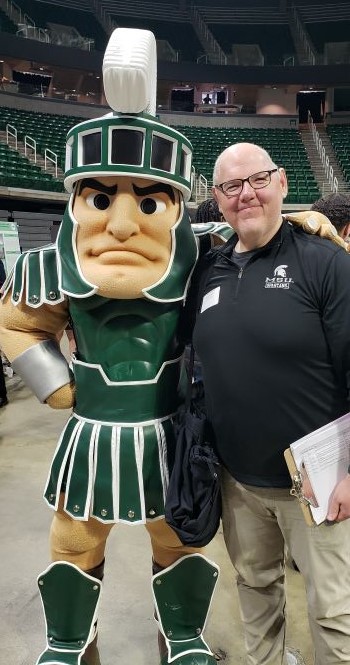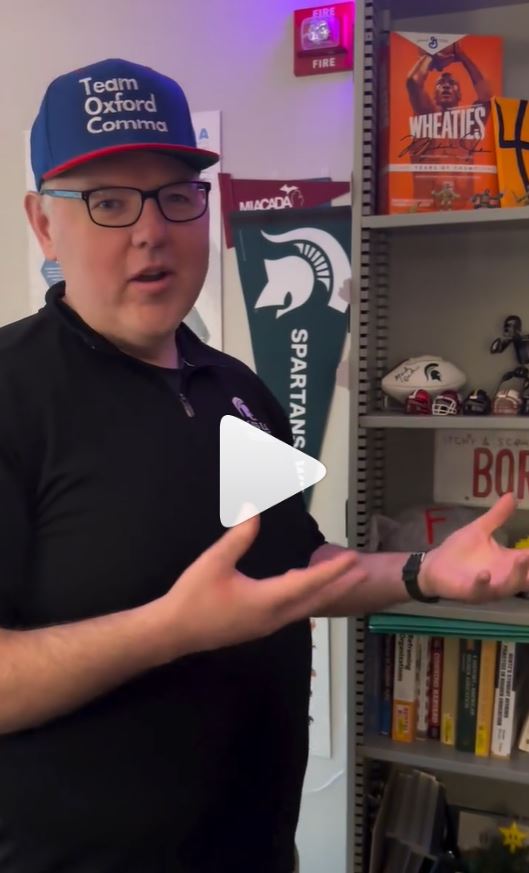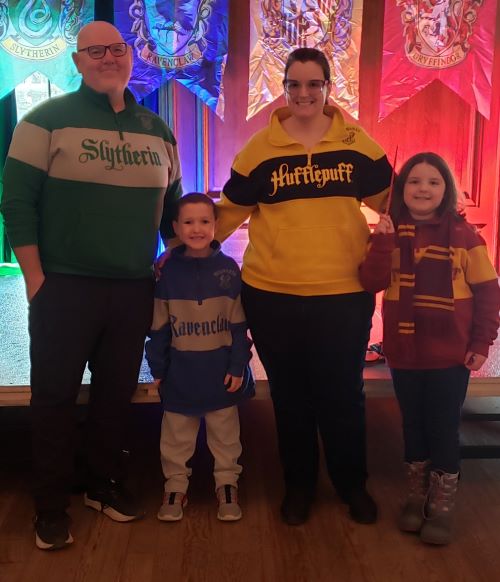PSY Academic Advisor Spotlight with Andrew Murray
June 11, 2025 - Shelly DeJong
 Meet Andrew Murray, an academic advisor in the Department of Psychology. Andrew knows firsthand what it’s like to adjust to a large school like Michigan State University from growing up in a small town. As a first-generation college student, Andrew is dedicated to each student’s success and being a constant source of support as they navigate their own paths at MSU. Get to know him below!
Meet Andrew Murray, an academic advisor in the Department of Psychology. Andrew knows firsthand what it’s like to adjust to a large school like Michigan State University from growing up in a small town. As a first-generation college student, Andrew is dedicated to each student’s success and being a constant source of support as they navigate their own paths at MSU. Get to know him below!
Your name comes up so often when I'm talking to students about people who have helped them in their MSU journey. I'm wondering what motivates you to help them succeed here at MSU?
There’s a deep, personal connection to the work I do; it’s not just a nine-to-five job where I punch the clock and answer emails. So much of why I’m here and why I do the work that I do has been because of my own personal experiences at Michigan State. There’s something truly special about East Lansing and MSU. I very much believe in the transformative nature of the MSU experience.
While some students might navigate their college journey fairly easily, others may find themselves floating along without a clear sense of direction. That’s what makes academic advising so purposeful. We serve as guideposts—providing direction and support throughout their journey. We often use analogies like that of a travel guide or I’m in the passenger seat while the student drives. It’s no longer just about attending college for four years and waiting for a job to be handed to you after graduation. Gaining experience through internships, volunteering, student organizations, and studying abroad presents its own challenges. Having a dedicated academic advisor as a consistent point of contact is crucial because students face a lot of changes during their college years. They may have different professors every semester and new roommates or living situations each year. But the academic advising relationship ideally remains steady. Personally, I didn’t have much consistency in my family life growing up, which makes me passionate about being a stable support for this generation of students.
As a first-generation college student yourself, how does that inform your work?
Having been a first-generation student at Michigan State, I understand what it feels like to navigate through new experiences. In a way, anything I do in higher education, even now, is a reminder of that. This perspective helps me remember that many students come in feeling wide-eyed and overwhelmed, realizing there is so much they don’t know. It’s important to take things slow and help prioritize information, explaining what they need to know today. I try to operate from the perspective that we should never make assumptions about what any student knows even when students reach their sophomore, junior, or senior years.

What does a typical day look like for you as an academic advisor?
A typical day involves responding to emails from students and other advisors, as well as meeting with students both in person and via Zoom. Every student that comes into the office or sends an email has unique questions and experiences, so I put time and thought into every student interaction. Some days include working on the undergraduate newsletter, working with the Psychology Club, or working on the psychology internship class.
When I’m not meeting with students, I’m having conversations about student success in a variety of different ways! I'm part of various committees focused on student success, including a campus-wide initiative to establish a centralized first-generation student center, as many resources are currently scattered around campus.
Recently, I co-chaired the planning of the Michigan Academic Advising Association conference that took place in early May. I've been involved with the organization since becoming an advisor, starting with attending conferences and eventually giving presentations. After serving two years on the executive board, I proposed hosting a conference at Michigan State University to celebrate the organization’s 20th anniversary. The association was founded at MSU in 2005, so we focused the theme on celebrating the past and present while looking toward the future. It was a really rewarding experience!
What’s a go-to piece of advice that you give students?
One of my pieces of advice to students is to “do it and prove it” which came from my own advisor, Ruth Mowry. At the time I had tunnel vision that I wanted to be a teacher, and she told me to prove it by actually doing it. When I went out and tried it, I found out that I didn’t want to be a teacher for the long run. I didn’t even know about other options—I never pushed myself to remove those blinders to find out what else was out there until I actually tried teaching.
The turning point came for me when I was student teaching 12th graders, and they’d ask me about college and life at MSU. I loved sharing my experiences. It dawned on me, with some encouragement from others, that I could make a career out of my undergrad leadership experiences that focused on student support. That realization led me back to MSU for a master's degree in student affairs administration, and I’ve been here ever since.
 Can you give a snapshot of your life outside of work?
Can you give a snapshot of your life outside of work?
My wife and I met at MSU. She’s now a high school English teacher in Holt. We have three kids, aged eight, six, and two, who keep us busy. We go to the park a lot, and my six-year-old has recently shown interest in fishing, so we’re learning that together. My oldest is very smart and enjoys singing and acting. We’re big fans of Harry Potter, Star Wars, and Spartan sports, going to games whenever we can.
I’m trying to focus more on reading these days instead of my comfort shows like The Office and Parks and Recreation! Currently, I’m listening to a 30-hour biography about Magic Johnson, which is fascinating.
Last but not least, what makes you proud to work at MSU in the Department of Psychology?
There's something truly special about Michigan State University—its community and the Spartan spirit create a unique bond among people. I had an experience at a Cubs game where, despite everyone wearing blue, I received numerous "go greens" from fellow MSU fans. There’s just a connection that we’re all a part of something bigger.
In psychology, students often come to better understand themselves and help others, which fosters a sense of community and the greater good. Those in social sciences often prioritize improving lives and making a positive impact which aligns with my own philosophy of leaving the world better than I found it.

